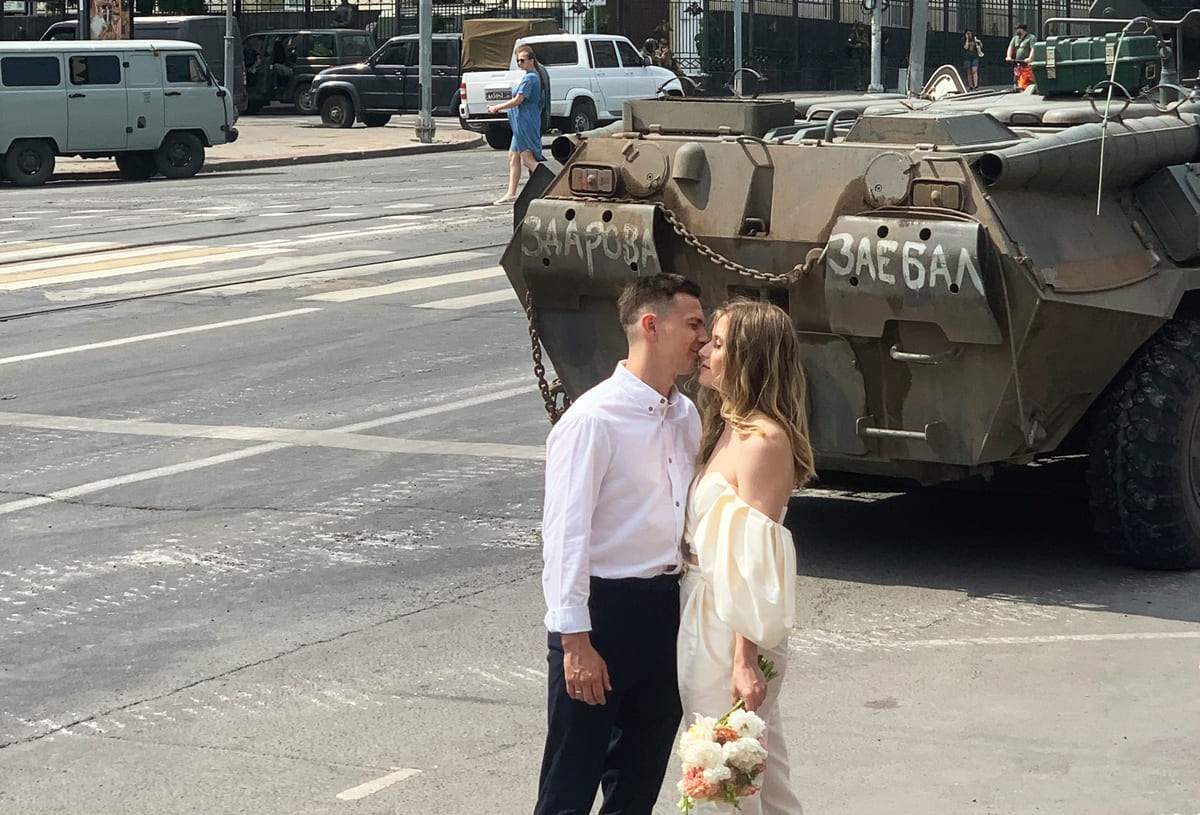
Residents of Rostov-on-Don will remember June 24, 2023, as the day gunfire echoed over the city, tanks rolled down the main streets, filled with loud crowds. This city was first occupied by the Wagner Group mercenaries, who then went to Moscow with a “march for justice”, to bring to account the leadership of the Ministry of Defense “for the genocide of the Russian people”. Novaya Vkladka reporter Alya Kachalova went out in the streets of Rostov-on-Don that day and saw some locals thanking the uninvited “guests”, while others were trying to run away and hide. Soon it all ended as suddenly as it had begun.
The original piece was published in June 2023.
– Why are you standing here and not defending your homeland? — a woman in the crowd shouted to the armed “wagnerites”.
– We’re not allowed to defend it.
– Our lads died there, she continued.
– Aren’t those your guys standing there? These people want the truth. Personally, I don’t believe what they say on TV, an older man joined in.
The morning of Youth Day, celebrated this year on June 24th, students from the biggest universities in Rostov received official news that their classes, exams, final presentations and dissertation discussions had been cancelled.
Alexei, a student at the Rostov State University of Economics, had an exam that was supposed to start at 8:30. Half an hour before the scheduled time students received a message from the dean’s office: all classes had been cancelled. Before that, according to Alexei, the university administration was impossible to reach, so the students sent a classmate to check what was happening. As he arrived in front of the building “men in uniform told him to leave”.
“I didn’t understand what was going on and what we were supposed to do, Alexei says. I saw on the news that some military groups were in town, but there was zero information from official sources. As if it was commonplace to have tanks and soldiers running around the city! At work, we all got an email begging us to stay home, so I did. I decided not to go to university and if I had had an exam, I would have asked to retake it the week after”.
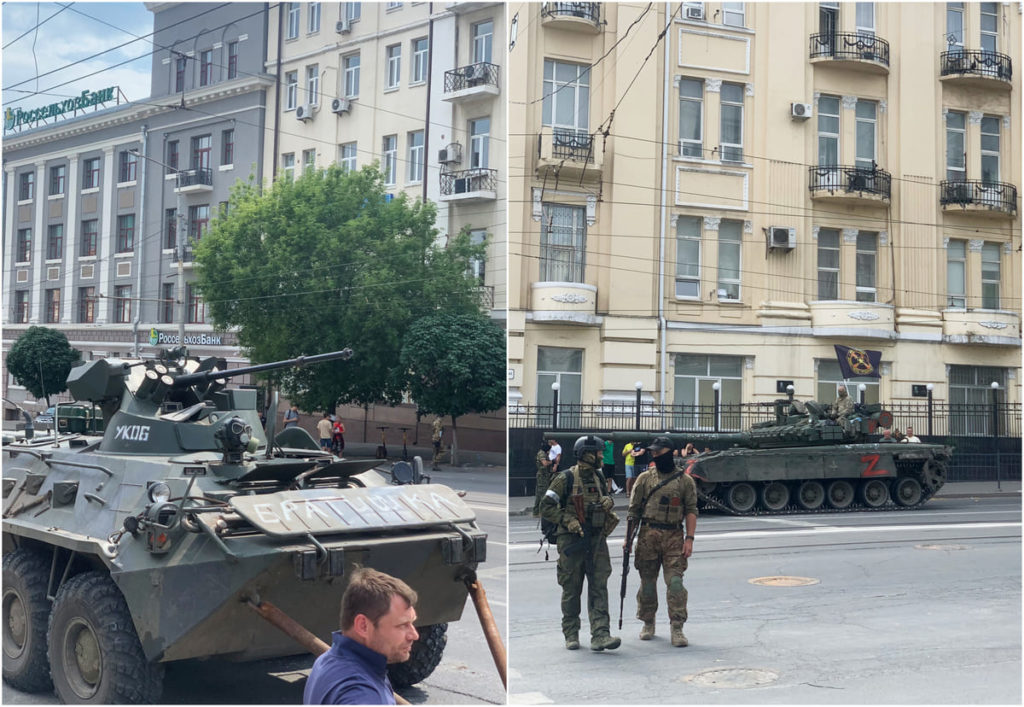
A local teacher told Novaya Vkladka that high school graduations were supposed to take place on the 23rd and 24th, but the celebrations were postponed until “further notice”. The Rostov Musical Theatre also cancelled productions, including the opera “The Tsar’s Bride”. Classes in dance studios across the city and at the Zheleznodorozhny Children’s Art Centre were also cancelled. Some bookshops and stationery shops in the city centre remained closed that day.
The day before, on the evening of June 23rd, Evgeny Prigozhin, founder of the illegal private military group Wagner, shared a voice note on his official Telegram channel accusing the Russian Defence Ministry of launching a missile strike on the mercenaries’ rear camps and announcing that his 25 thousand fighters will go on the “march for justice”. In response, officials opened a criminal case against Prigozhin for calling for an armed mutiny.
On the night of June 24th, supporters of the Wagner Group took control of the law enforcement buildings in Rostov-on-Don. Tanks rolled down the city streets. Governor Vasily Golubev said that public transport “is still working, but the routes within the city centre have been changed” and urged residents to stay at home when possible.
In Rostov-on-Don, Prigozhin held informal talks with representatives of the Ministry of Defence, where he said: “We want the Chief of General Staff and Shoigu [Minister of Defense]. Until we get them, we will stay here, besieging the city of Rostov and heading to Moscow”. President Vladimir Putin went on TV and officially promised that those who “betrayed Russia” would “bear the consequences” while Ramzan Kadyrov, the head of Chechnya, said: “Fighters of the Ministry of Defense and the Federal Guard Service of the Chechen Republic are on their way to the affected regions”.
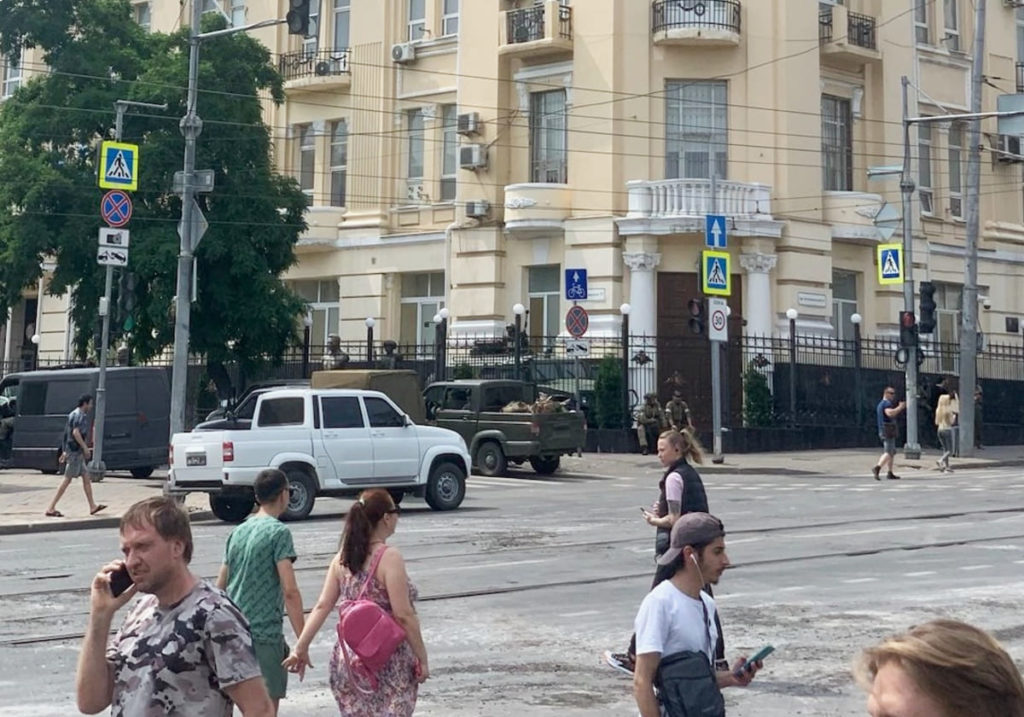
“There have been attempts in Russian history to split our society and to rekindle the flames of civil war, wrote Governor Golubev later in his Telegram channel. The Don [river] remembers that difficult time all too well. We cannot let it happen again. The Rostov region stands with the president!”.
Throughout the day, representatives of the Wagner Group continued to report that they were moving towards Moscow, engaging in small clashes with army aviation. The denouement happened abruptly: in the evening the press service of the Belarusian president Alexander Lukashenko reported that he had held successful talks with Prigozhin. After that, the founder of the Wagner Group published a voice message, as he usually does, announcing that he was stopping the “march for justice” and was pulling back his units. He added that his men had stopped just 200 km away from the Russian capital.
But on June 24th no one in Rostov-on-Don knew it would end like this.
Queue at the ATM
Lenin Street was relatively quiet in the middle of the day, but at the checkpoint on the way to the Helicopter Factory, groups of fully-equipped soldiers sat in groups. Nearby, by the police station and the riot police headquarters, there were cars with “Rosgvardiya” [the National Guard of Russia] insignia on them.
Unlike usually on weekends, that day this part of town looked deserted. I spoke to a local woman who had come outside to sell flowers, oblivious to the fact that the area was full of soldiers. Her relatives live in England, where it “must be very nice right now”. She has been travelling abroad for twenty-three years and today she thinks it would be nice to move there, she told me.
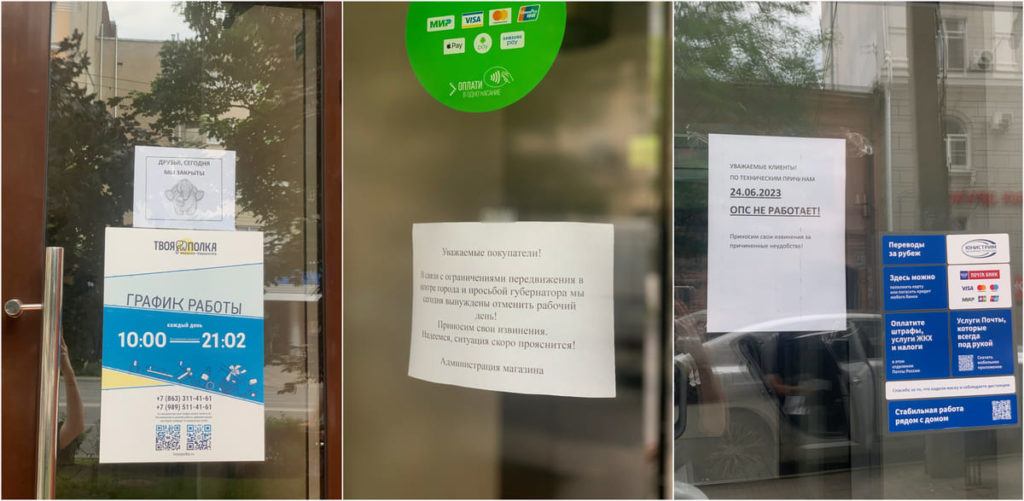
Notes appeared on the doors of post offices, saying they were temporarily closed “for technical reasons”. There was no indication of time on those notes, but the helpline operators said offices were closed “due to the situation in the city” and that nobody knew how long until they would re-open. “Tomorrow is a holiday, so check on Monday,” the employee said.
Many branches of the CDEC courier delivery service in the city centre weren’t working either. An employee at one of the offices on Lenin Street said that deliveries might be delayed “due to the situation in the city”. She asked me if the ATM at the “Solnechny Krug” grocery store nearby was working. She had heard it wasn’t. But the ATM was working and a small queue had already gathered in front of it.
Some OZON [a popular Russian online marketplace, similar to Amazon] pick-up points on the main streets remained closed. Wildberries [another popular e-commerce platform] offices worked as usual. “Everything is as usual”, I was told. However, all the goods with Wagner Group insignia had been removed from the online shop.
Many shops on Bolshaya Sadovaya Street didn’t open that day, about two-thirds, by my estimates. But clothes weren’t in demand that day, unlike groceries.
“They had to feed the families and their kids needed them — that’s was their argument for not coming in for shifts”
On the 24th of June, some grocery shops imposed restrictions on ‘socially important goods’. The dairy shelves in one of the Magnit supermarkets [a popular national chain] did look emptier than usual, but I didn’t see anyone leaving with huge bags full of grains or dairy products. Rostov City Manager Alexei Logvinenko said: “There is enough food in the retail chains and shops” and “There is no shortage of fuel either”.
Restaurants and cafes were working as usual, but not everywhere. I saw teenagers walking around with paper bags and cups from “Vkusno i tochka” [a Russian fast food chain that was opened to replace McDonald’s in the country after the company closed its restaurants following Russia’s invasion of Ukraine] in the Lenin district. But on Pushkinskaya Street and Voroshilovsky Avenue, the fast-food restaurant was closed. A woman working in Dodo Pizza [another fast food chain] told me half of their team was afraid to work their shifts. Delivery riders, for example, stayed home because their wives were too scared to let them go out.
“They had to feed the families and their kids needed them — that’s was their argument for not coming in for shifts. It’s understandable”, the woman said.
She herself drove to the city centre early in the morning, in time for the opening of the pizzeria, “half-asleep”. When she saw military vehicles and men in uniform, she did not understand the scale of what was happening: “On my way to work I thought that it would all be over in a few hours. People are working, public transport is running, everything is OK”. It was only later in the day that she realised how frightened both the staff and visitors were.
Like in 1991
On the streets, people were saying that Kadyrov’s soldiers would soon enter the city to fight the “wagnerites”.
“There are all kinds of Chechens, loonies, and Russian loonies”, one woman said pensively to her friend as they walked through an underpass. “Maybe it’s all planned like it was in 1991,” I overheard two men saying on their way out of the underpass.
Meanwhile, on Budyonnovsky Avenue, near the headquarters of the Southern Military District, occupied by Wagner, mercenaries were handing out Wagner Group flags to Rostov citizens. People took photos with men in military uniform (who were more than happy to pose for them) and armoured vehicles. A newlywed couple asked their friends to take a picture of them kissing in front of a tank.
Rare gunshots echoed through the streets. Road traffic stopped, and a busy avenue turned into a pedestrian street. At the same time, for a place where shots had just been fired, it was too crowded with all kinds of people, young and old, men and women. Some participated in heated discussions, others listened carefully. There were no police in the area.
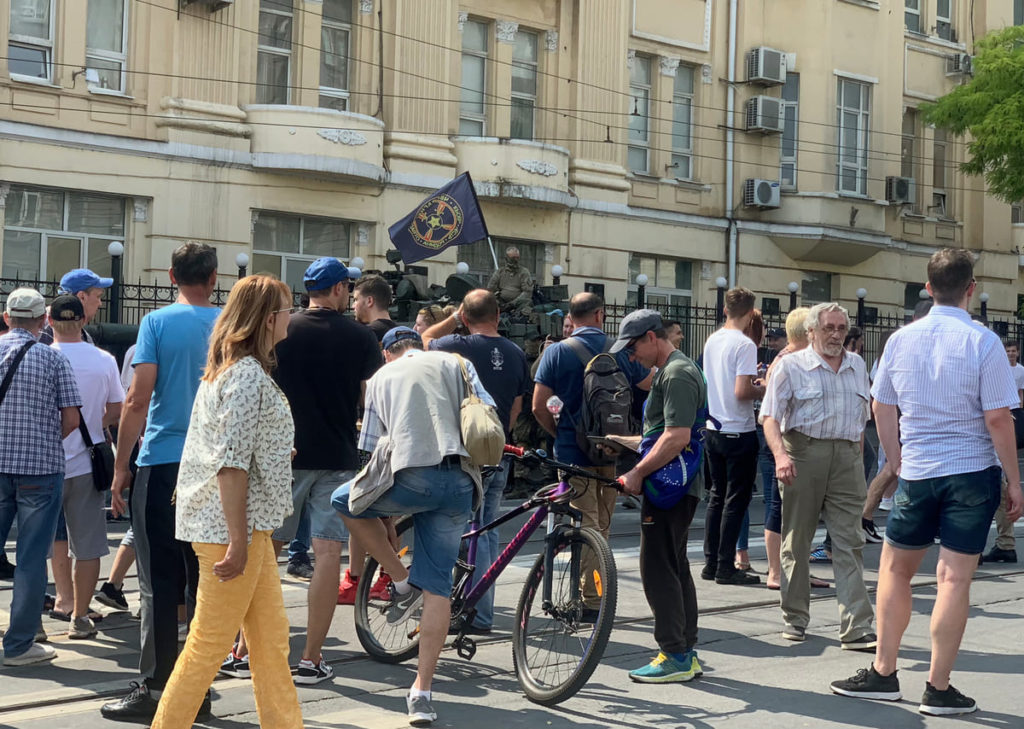
People gathered around the soldiers who were answering their questions. I came closer to one group of people to be able to hear what they were talking about.
– Everyone in Rostov is our hostage now, one of the soldiers said.
– So we’re prisoners, then? — a young girl asked playfully, snuggling up to the young man standing beside her.
There were many young men in the crowd. One of them stood out, wearing an anime black cosplay costume from Naruto. I asked him what his outfit meant. It turned out he belonged to the Akatsuki order and was keeping an eye on everything that was going on.
The self-proclaimed member of the Akatsuki Order said he was monitoring the situation, to make sure “everything was tidied up”.
– Who’s going to tidy up?
– Them, he said, pointing to the Wagner soldiers.
People in the crowd were saying that the Wagner Group must not give up their position after the start of the mutiny, otherwise, it would not do any good. Someone asked whether they thought they would end up here today.
– We were told to go out, so we did, one of the armed men said.
– The guys supported their commander, they couldn’t leave him, pointed out one of the locals.
In general, people are divided, when it comes to the Wagner Group’s actions. On social media groups some wrote: “Armed men, sitting on top of tanks, they came into town, abandoning the front lines, in search of justice?” Others responded, “They’re not going to shed blood, they’re going to demand the truth.”
“I was standing on my tiptoes and I was being carried by a wave”
Meanwhile, there were traffic jams on roads leading out of the city. On the M-4 “Don” highway, Emergency services were giving out water. Pet shops were full of people buying pet carriers. Not everyone knew when and where they were heading. Rather, they were stocking up because they had no idea when they would have to make a quick decision. According to media reports, by evening time it was impossible to take a bus at the bus station and the train station was bursting with people.
A local woman told me that she had bought a ticket for a regional train from Rostov-on-Don to Volgodonskaya on the Russian Railways app. She went to Salsk to visit her parents because her mother was not feeling well with everything that was happening. For this type of train, tickets are sold without an assigned seat, but usually, there are enough seats for everyone, you might have to stand just for half an hour, she told me. But on that day people filled the whole platform. When the train arrived it was clear that there were too many people.
“It was terribly crowded. I wouldn’t say deadly, but at one point I realised I was standing on my tiptoes and I was being carried by a wave, she recalls. I shouted a couple of times to stop people from pushing behind me, and everyone calmed down after that. There were some “specimens” who shouted and pushed everyone around. But no accidents: nobody fell on the platform”.
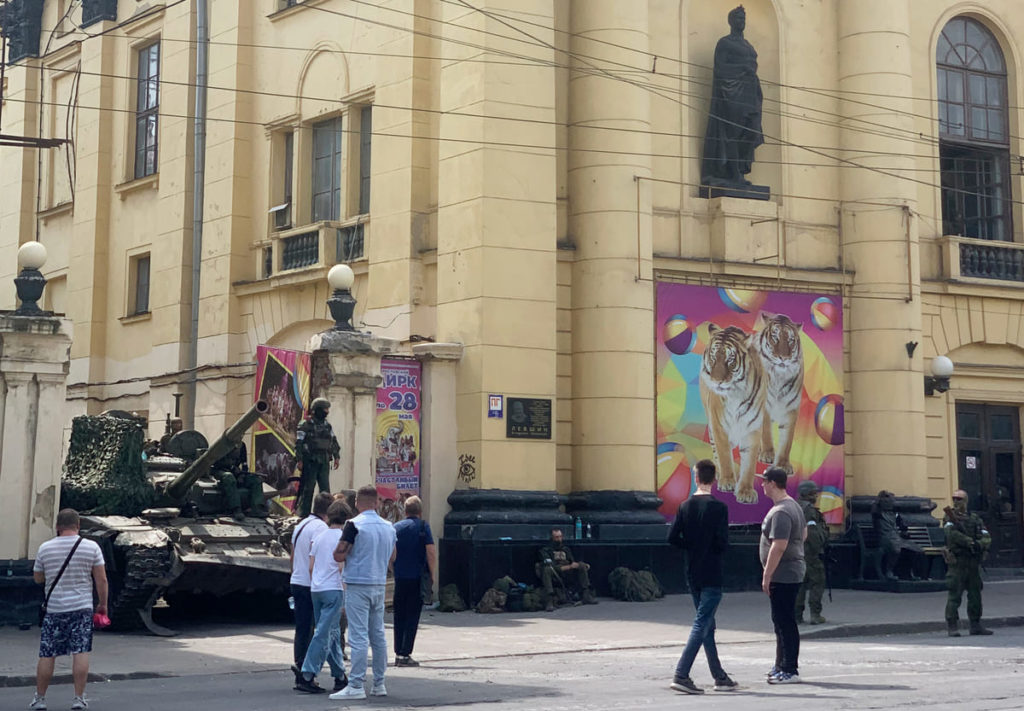
As we were boarding, it was announced that only those who were going to the train’s terminus would be allowed on board. In other words, the train wasn’t going to stop in Salsk.
Russian Railways workers offered people with purchased tickets to board the next train, that was going to stop in Salsk. But the woman saw how many people were left on the platform, and realized that they would not fit. “I started thinking: maybe I should take the bus. I checked with a friend, she and her boyfriend were on their way home to Salsk, they had already set off and driven past Bataisk. I took a taxi from the train station, got there, got into their car, and we left”, she said.
Eventually, Wagner Group soldiers also left Rostov. Accompanied by the cheering crowd, the men in military uniform got inside the cars in which they had arrived. When police cars arrived to take their place, about a hundred people started chanting “shame” to the policemen. The police officers realized they were considered “traitors” here. In the comments section of the video of the scene, locals wrote: “They could have stayed at their headquarters for another week”, and “Cops to the front!”





